check engine Citroen C1 RHD 2016 1.G Owner's Manual
[x] Cancel search | Manufacturer: CITROEN, Model Year: 2016, Model line: C1 RHD, Model: Citroen C1 RHD 2016 1.GPages: 268, PDF Size: 7.09 MB
Page 5 of 268
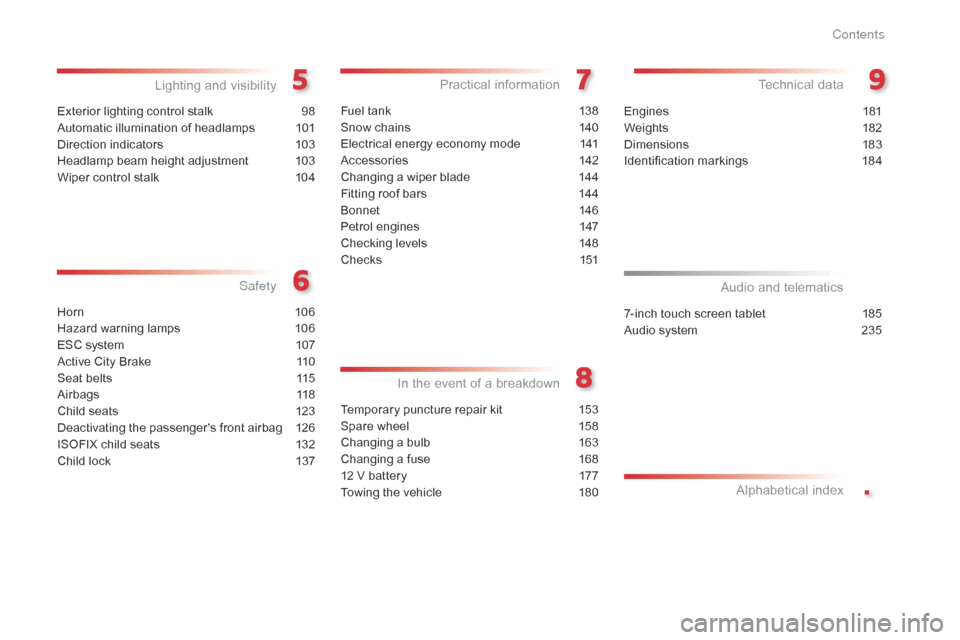
.
Exterior lighting control stalk 98
Automatic illumination of headlamps
1
01
Direction
indicators
1
03
Headlamp
beam height adjustment
1
03
Wiper
control stalk
1
04
Lighting and v isibility
Horn 10 6
Hazard warning lamps
1
06
ESC
system
1
07
Active
City Brake
1
10
Seat
belts
1
15
Airbags
1
18
Child
seats
1
23
Deactivating
the passenger's front airbag
1
26
ISOFIX
child seats
1
32
Child
lock
1
37
SafetyIn
t
he
e
vent
o
f
a
b
reakdown
Fuel tank 138
Snow chains
1
40
Electrical
energy economy mode
1
41
Accessories
1
42
Changing
a wiper blade
1
44
Fitting
roof bars
1
44
Bonnet
14
6
Petrol
engines
1
47
Checking
levels
1
48
C h e c ks
1
51
Practical information Technical da ta
7-inch touch screen tablet 185
Audio system
2
35
Audio and telematics
Alphabetical
in
dex
Temporary puncture repair kit 1 53
Spare wheel
1
58
Changing
a bulb
1
63
Changing
a fuse
1
68
12
V battery
1
77
Towing
the vehicle
1
80Engines
1
81
Weights
1
82
Dimensions
1
83
Identification
ma
rkings
1
84
Contents
Page 10 of 268
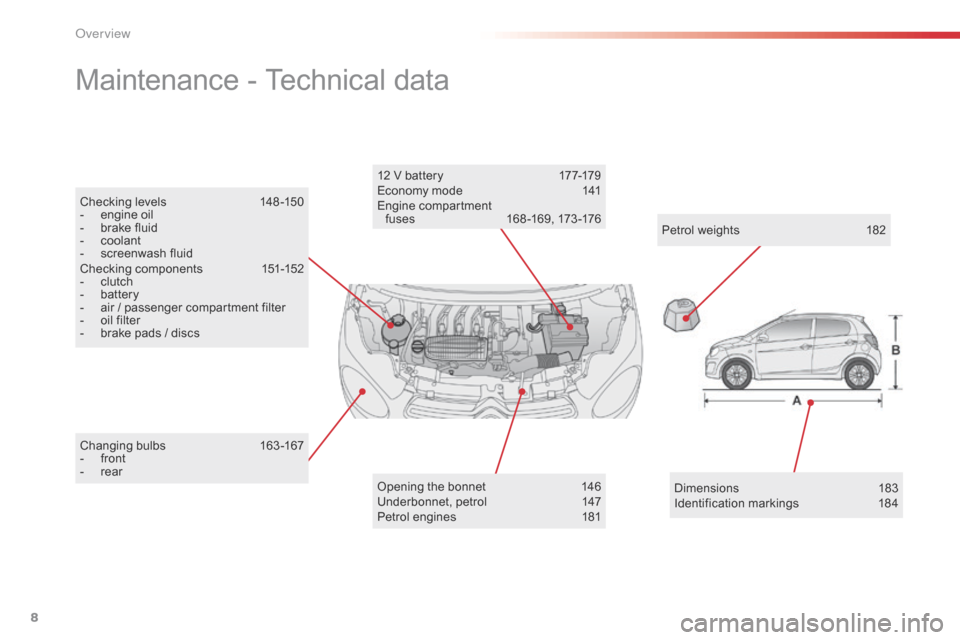
8
Changing bulbs 1 63-167
- f ront
-
r
ear
Maintenance - Technical data
Opening the bonnet 1 46
Underbonnet, petrol 1 47
Petrol
engines
1
81
12
V battery
1
77-179
Economy mode
1
41
Engine
c
ompartment
f
uses
1
68 -169, 173 -176
Petrol weights
1
82
Checking
levels
1
48 -150
-
e
ngine
oil
-
b
rake
fluid
-
c
oolant
-
s
creenwash
fluid
Checking
components
1
51-152
-
c
lutch
-
b
attery
-
a
ir
/
passenger
compartment
filter
-
o
il
filter
-
b
rake
pads
/
discs
Dimensions 1 83
Identification
ma
rkings
1
84
Over view
Page 12 of 268
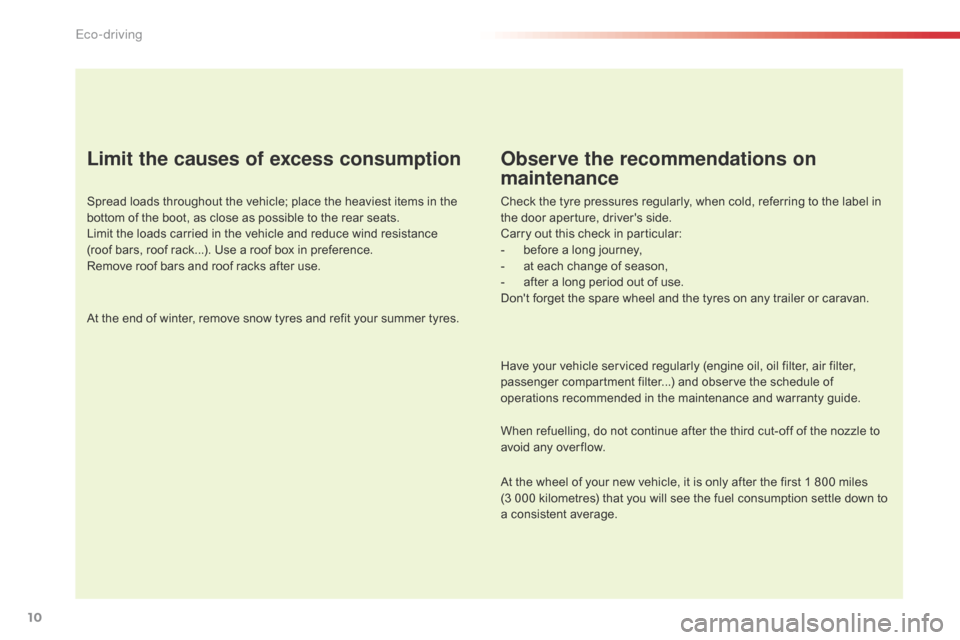
10
Limit the causes of excess consumption
Spread loads throughout the vehicle; place the heaviest items in the bottom of the boot, as close as possible to the rear seats.
Limit
the loads carried in the vehicle and reduce wind resistance
(roof
bars, roof rack...). Use a roof box in preference.
Remove
roof bars and roof racks after use.
At
the end of winter, remove snow tyres and refit your summer tyres.
Observe the recommendations on
maintenance
Check the tyre pressures regularly, when cold, referring to the label in the door aperture, driver's side.
Carry
out this check in particular:
-
b
efore a long journey,
-
a
t each change of season,
-
a
fter a long period out of use.
Don't
forget the spare wheel and the tyres on any trailer or caravan.
Have
your vehicle serviced regularly (engine oil, oil filter, air filter,
p
assenger compartment filter...) and observe the schedule of
o
perations recommended in the maintenance and warranty guide.
When
refuelling, do not continue after the third cut-off of the nozzle to
a
void any over flow.
At
the wheel of your new vehicle, it is only after the first 1 800 miles
(
3 000 kilometres) that you will see the fuel consumption settle down to
a
consistent average.
Eco-driving
Page 18 of 268
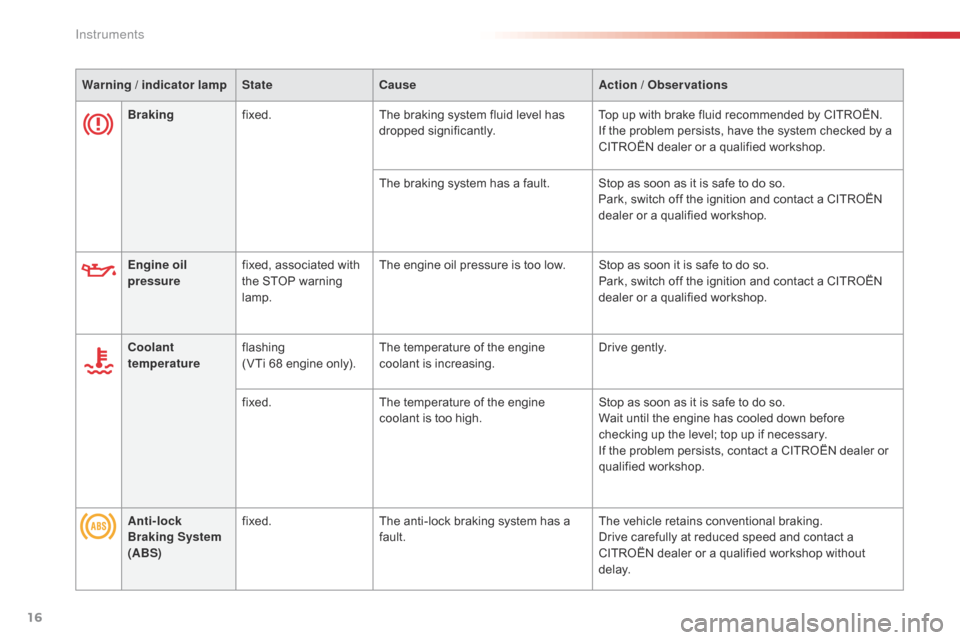
16
Brakingfixed. The braking system fluid level has d
ropped s ignificantly.Top
up with brake fluid recommended by CITROËN.
If the problem persists, have the system checked by a
C
ITROËN dealer or a qualified workshop.
The
braking system has a fault. Stop as soon as it is safe to do so.
Park,
switch off the ignition and contact a CITROËN
d
ealer or a qualified workshop.
Warning
/ indicator lamp
State Cause Action
/ Observations
Engine oil
pressure fixed,
associated with
t
he STOP warning
lam
p.The
engine oil pressure is too low. Stop as soon it is safe to do so.
Park,
switch off the ignition and contact a CITROËN
d
ealer or a qualified workshop.
Coolant
temperature flashing
(
VTi 68 engine only).The
temperature of the engine
c
oolant
i
s
inc
reasing.Drive
gently.
fixed. The
temperature of the engine
c
oolant is too high.Stop
as soon as it is safe to do so.
Wait
until the engine has cooled down before
c
hecking up the level; top up if necessary.
If
the problem persists, contact a CITROËN dealer or
q
ualified
w
orkshop.
Anti-lock
Braking System
(ABS) fixed.
The
anti-lock braking system has a
f
ault.The
vehicle retains conventional braking.
Drive
carefully at reduced speed and contact a
C
ITROËN dealer or a qualified workshop without
d
e l ay.
Instruments
Page 19 of 268
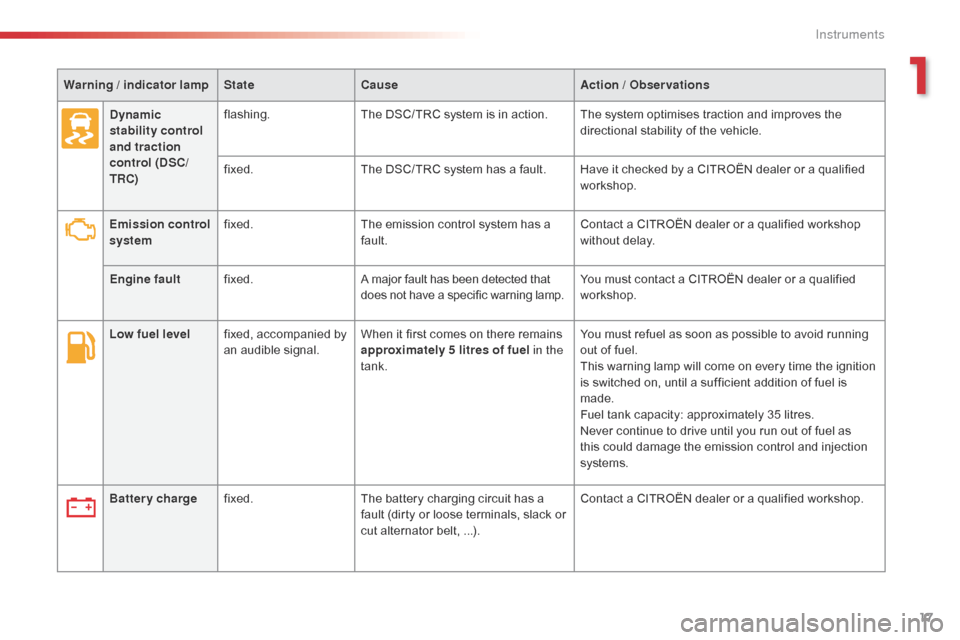
17
Low fuel levelfixed, accompanied by a
n audible signal.When
it first comes on there remains a
pproximately 5 litres of fuel in the
tank. You
must refuel as soon as possible to avoid running o
ut of fuel.
This
warning lamp will come on every time the ignition
i
s switched on, until a sufficient addition of fuel is
m
ade.
Fuel
tank capacity: approximately 35 litres.
Never
continue to drive until you run out of fuel as
t
his could damage the emission control and injection
s
ystems.
Battery charge fixed. The
battery charging circuit has a
f
ault (dirty or loose terminals, slack or
c
ut alternator belt, ...).Contact
a CITROËN dealer or a qualified workshop.
Emission control
system
fixed.
The emission control system has a
f
ault.
Contact a CITROËN dealer or a qualified workshop
w
ithout delay.
Engine fault fixed. A major fault has been detected that
d
oes not have a specific warning lamp.
You must contact a CITROËN dealer or a qualified
w
orkshop.
Dynamic
stability control
and traction
control (DSC/
TRC)
flashing.
The DSC/ TRC system is in action. The system optimises traction and improves the
d
irectional stability of the vehicle.
fixed. The DSC/ TRC system has a fault. Have it checked by a CITROËN dealer or a qualified
w
orkshop.
Warning
/ indicator lamp
State Cause Action
/ Observations
1
Instruments
Page 21 of 268
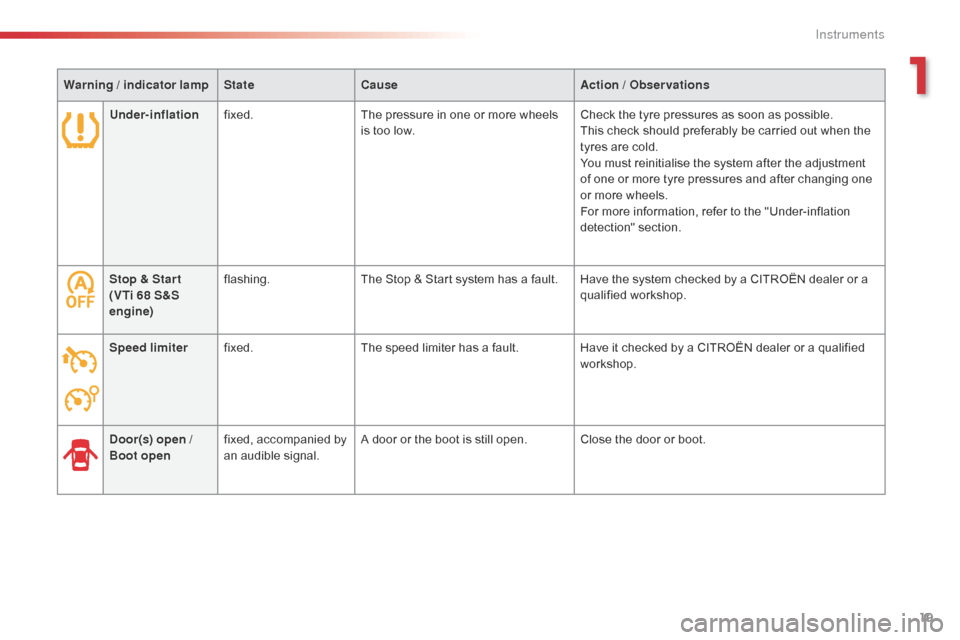
19
Stop & Star t
(VTi 68 S&S
engine)flashing.
The Stop & Start system has a fault. Have the system checked by a CITROËN dealer or a q
ualified w orkshop.
Speed limiter fixed. The
speed limiter has a fault.Have
it checked by a CITROËN dealer or a qualified
w
orkshop.
Door(s) open
/
Boot open fixed,
accompanied by
a
n audible signal.A
door or the boot is still open. Close the door or boot.
Warning
/ indicator lamp
State Cause Action
/ Observations
Under-inflation fixed. The pressure in one or more wheels
i
s too low.
Check the tyre pressures as soon as possible.
This check should preferably be carried out when the
t
yres are cold.
You must reinitialise the system after the adjustment
o
f one or more tyre pressures and after changing one
o
r more wheels.
For more information, refer to the "Under-inflation
d
etection"
s
ection.
1
Instruments
Page 86 of 268
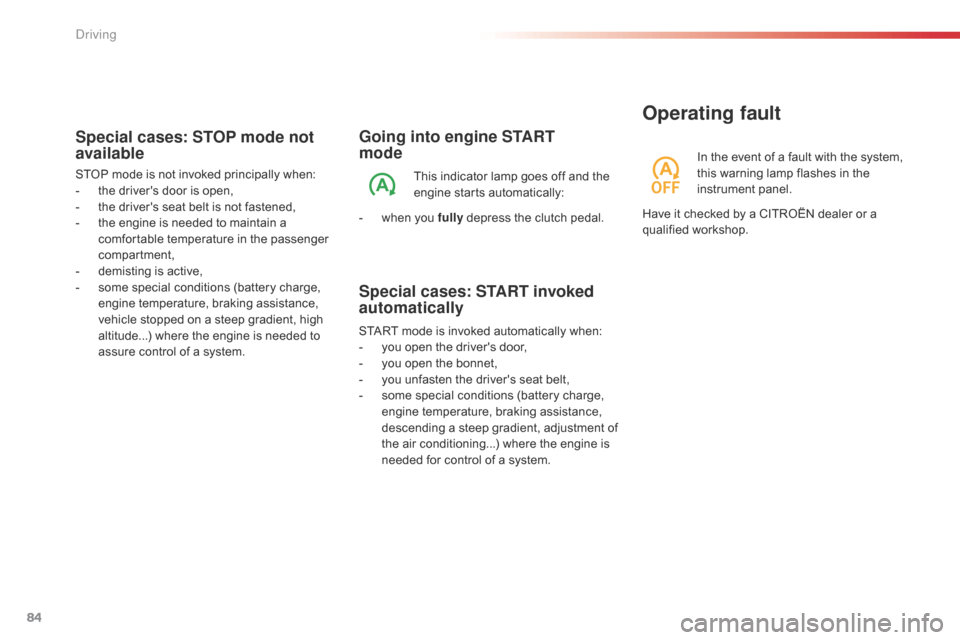
84
Going into engine START
mode
This indicator lamp goes off and the engine s tarts a utomatically:
-
w
hen
you fully
depress the clutch pedal.
START
mode is invoked automatically when:
-
y
ou
open the driver's door,
-
y
ou
open the bonnet,
-
y
ou
unfasten the driver's seat belt,
-
s
ome
special conditions (battery charge,
e
ngine temperature, braking assistance,
d
escending a steep gradient, adjustment of
t
he
air conditioning...) where the engine is
n
eeded for control of a system.
Special cases: START invoked
automatically
In the event o f a f ault w ith t he s ystem, t
his warning lamp flashes in the
in
strument
pan
el.
Operating fault
Have it checked by a CITROËN dealer or a qualified w orkshop.
Special cases: STOP mode not
available
STOP mode is not invoked principally when:
- t he driver's door is open,
-
t
he driver's seat belt is not fastened,
-
t
he engine is needed to maintain a
c
omfortable temperature in the passenger
c
ompartment,
-
d
emisting is active,
-
s
ome special conditions (battery charge,
e
ngine temperature, braking assistance,
v
ehicle stopped on a steep gradient, high
a
ltitude...) where the engine is needed to
a
ssure control of a system.
Driving
Page 111 of 268

109
The TRC and DSC systems offer increased safety in normal driving, but
s
hould not encourage the driver to take
e
xtra risks or drive at high speed.
The correct operation of these
systems
depends on observation of
t
he
ma
nufacturer's
r
ecommendations
r
egarding the wheels (tyres and rims),
t
he braking components, the electronic
c
omponents and the assembly and
r
epair procedures used by CITROËN
d
ealers.
After
an impact, have the system
c
hecked by a CITROËN dealer or a
q
ualified
w
orkshop.
Deactivation
In exceptional conditions (starting a vehicle which is bogged down, stuck in snow, on soft
g
round...), it may be advisable to deactivate the
D
SC and TRC systems, so that the wheels can
s
pin freely and regain grip.
Operating fault
However, it is recommended that these systems be reactivated as soon as possible.
F
P
ress this button briefly.
This
warning lamp comes on: the
T
RC system no longer acts on the
o
peration of the engine.
Reactivation
The TRC and DSC control systems are reactivated automatically every time the engine
i
s started. F
P
ress the button again to
r
eactivate it manually. Illumination
of this warning lamp, a
ccompanied by an audible signal,
i
ndicates a fault with the system.
Drive
carefully at reduced speed and contact
a
CITROËN dealer or a qualified workshop to
h
ave the system checked.
Deactivation of the TRC system only
Deactivation of the TRC and DSC systems F
V
ehicle stationary , press this
button
for
at
least
than
3
seconds.
These
warning
lamps
come
o
n:
the
TRC
and
DSC
s
ystems
no
longer
act
on
t
he
operation
of
the
engine. When
the TRC system only is deactivated, it is
r
eactivated as the vehicle's speed increases.
When
both the TRC and DSC systems are
d
eactivated, they do not reactivate themselves
e
ven if the speed of the vehicle increases.
6
Safety
Page 148 of 268
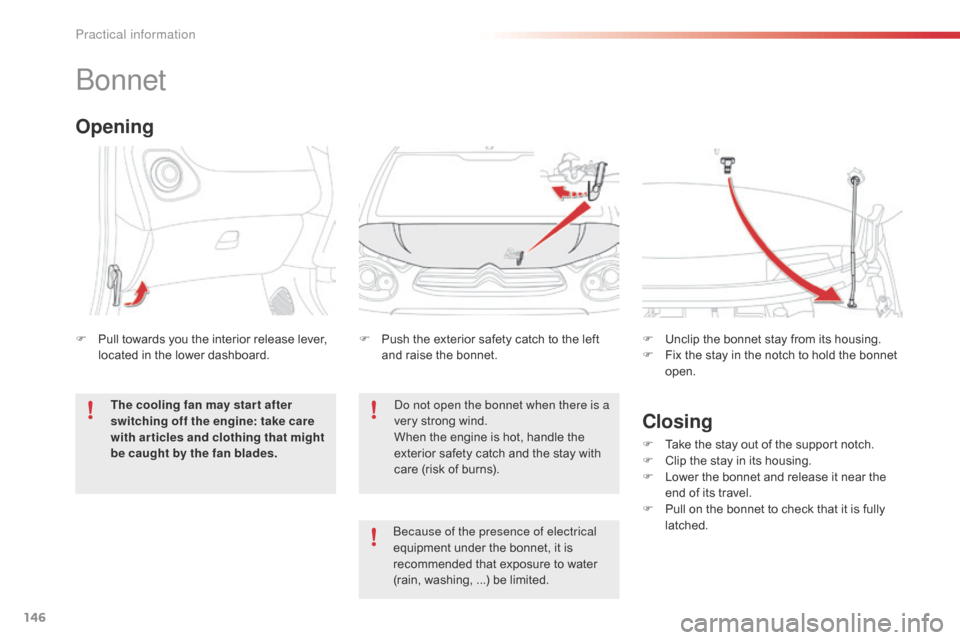
146
Bonnet
Do not open the bonnet when there is a
very strong wind.
When
the engine is hot, handle the
e
xterior safety catch and the stay with
c
are (risk of burns).
F
P
ush the exterior safety catch to the left
a
nd raise the bonnet.
F
U
nclip the bonnet stay from its housing.
F
F
ix the stay in the notch to hold the bonnet
ope
n.
Opening
F Pull
towards you the interior release lever, l
ocated in the lower dashboard.
The cooling fan may star t after
switching off the engine: take care
with articles and clothing that might
be caught by the fan blades.
Closing
F Take the stay out of the support notch.
F C lip the stay in its housing.
F
L
ower the bonnet and release it near the
e
nd of its travel.
F
P
ull on the bonnet to check that it is fully
l
atched.
Because of the presence of electrical
equipment
under
the
bonnet,
it
is
r
ecommended
that
exposure
to
water
(
rain,
washing,
...)
be
limited.
Practical information
Page 149 of 268
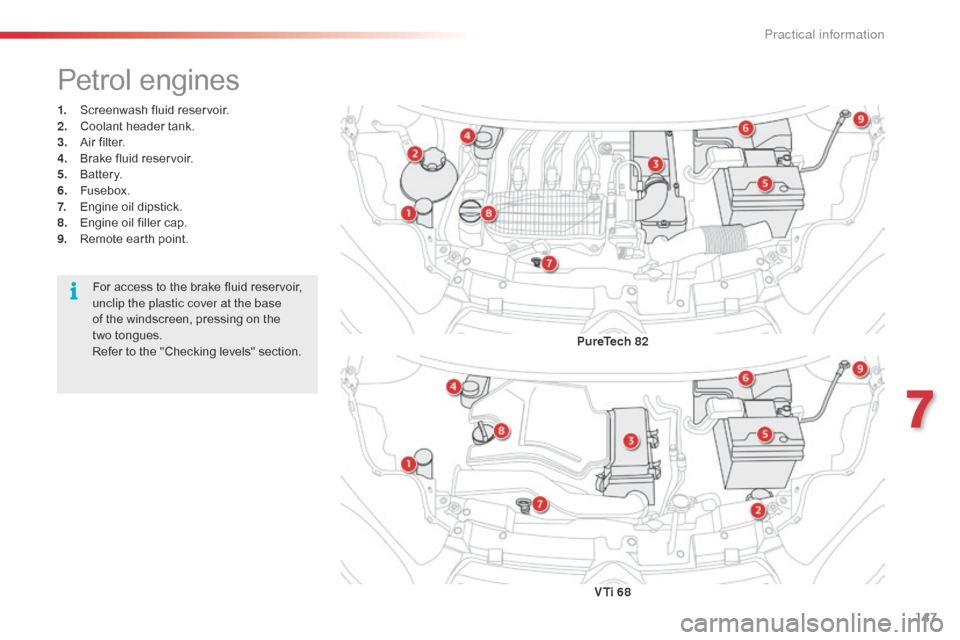
147
1. Screenwash fluid reservoir.
2. C oolant header tank.
3.
A
ir filter.
4.
B
rake fluid reservoir.
5.
B
attery.
6.
F
usebox.
7.
E
ngine oil dipstick.
8.
E
ngine oil filler cap.
9.
R
emote earth point.
Petrol engines
PureTech 82
VTi 68
For
access
to
the
brake
fluid
reservoir,
u
nclip the plastic cover at the base
of
the
windscreen,
pressing
on
the
t
wo tongues.
Refer
to
the
"Checking
levels"
section.
7
Practical information